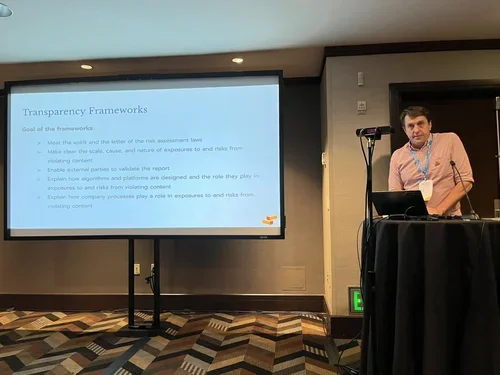Research
The Integrity Institute’s research comes directly from the people who know platforms best—550+ trust and safety professionals from 80+ tech companies. We transform their expertise into original research, industry best practices, and policy guidance.
Featured Research
All Research

Mapping Foreign Influence Operations Across U.S. Online Spaces
On November 14, 2025, the Integrity Institute released a report on electoral interference in online spaces in the U.S. Nicholas Shen, Elections Fellow, led the development of this retrospective analysis of online foreign influence operations during the 2020 and 2024 U.S. Presidential Elections.

Platform Datasets: Challenges, Insights, and Examples for Researchers under Article 40 of the Digital Services Act
This report aims to assist researchers studying risks and harms outlined in the Digital Services Act and the Code of Practice on Disinformation by enabling an understanding of the relevant data that exists within platforms and that which is accessible via APIs–and the relationships between internal data and public facing APIs.

AI Chatbots and Youth Mental Health: A Review of Research
Integrity Institute staff and membership have compiled a review of research specifically focused on the impact of LLM-powered chatbots on youth mental health. Building on research conducted with Integrity Institute members through the Generative Identity Initiative, this report identifies key themes from research into LLMs and youth mental health.

Prevention by Design: A Roadmap for Tackling TFGBV at the Source
While existing solutions to tech-facilitated gender-based violence (TFGBV)—such as content moderation—address harm reactively, they place the burden of safety on victims. We partnered with the Council on Technology & Social Cohesion to advocate for a proactive, design-focused approach that embeds safety and user empowerment into social media platform design.

Risk Dimensions and Mitigation Effectiveness
A recommendation on how assessing the scale, cause, and nature of risks enables platforms to justify and implement more effective mitigation measures.

Risk Assessment Guidance and Initial Analysis
An overview of the Integrity Institute’s risk assessment methodology, providing a structured approach for regulators to more comprehensively assess platform risks.

Global Transparency Audit
We’ve developed a comprehensive evaluation of the current state of platform transparency, including an analysis of reports submitted by platforms under the Digital Services Act (DSA). This report highlights how to strengthen global transparency efforts to achieve more meaningful transparency.

Non-Engagement Signals in Content Ranking
Developed in cooperation with Pinterest and UC Berkeley, we share how to use non-engagement signals for content ranking in social platforms.

Who Voters Trust for Election Information in 2024
With the Bipartisan Policy Center and the States United Democracy Center, we released new survey results exploring how Americans consume, assess, and engage with election information in 2024. We found that Americans learn about elections primarily through television and social media. Authoritative sources may struggle to break through or create universal narratives amidst a crowded information environment.

On Risk Assessment and Mitigation for Algorithmic Systems
Our report defines what risk assessments, audits, and mitigation plans should include to cover algorithmic systems used by online platforms.

Why Is Instagram Search More Harmful Than Google Search?
Chief research officer Jeff Allen writes about Instagram’s decision to disable search for sensitive topics and the Instagram we can’t have, using eating disorder content as an example.

Building Integrity into AI Systems
Think social media is bad? AI could make it worse. The good news: we can fix both. AI’s rise closely mirrors the rise of social media platforms in the early 2000s. In fact, many of the challenges to developing and adopting “safe” AI are the same challenges integrity workers have faced for years as they have built and operated social media platforms.

Child Safety on Online Platforms with Vaishnavi J.
With the Senate Child Safety Hearing on the horizon, Trust in Tech podcast sat down with Vaishnavi, former head of Youth Policy at Meta and chat about the specific problems and current policy landscape regarding child safety.

Child Safety Online Briefing
Our briefing deck for Senate staffers to help them prepare for the hearing and guide their Senator’s statements and line of questioning.

Child Safety Online: Policy Recommendations
Integrity Institute delineates the best practices we advocate for Child Safety across all digital platforms

How Much Has Social Media Affected Polarization?
Following the first published research from the 2020 Facebook and Instagram Election Study (FIES), Tom shows that social media has probably not made a huge contribution to US polarization and how we can extrapolate estimates from the FIES to other effects of interest, specifically the aggregate impact of social media on the US over the last 20 years.

Meaningful Platform Transparency to Inform Society & Prepare for Upcoming Regulations
Institute co-founder Jeff Allen presented at TrustCon in July 2023.

Technology Policy Tracker
Since the summer of 2023, organizers from Cambridge Local First, the Integrity Institute,Tech Policy Press, and Digital Policy Alert have been collaborating on data-building initiatives around major policy happening at the US federal and state level.

Focus on Features
Minimize digital harms through design, a guide for product managers and lawmakers.

Responsibly Supporting Elections on Online Platforms
With a wave of 65 elections across 54 countries coming in 2024, including a US presidential election, the Integrity Institute is releasing a new guide – the first in a planned series – on best practices for online companies to help better support healthy elections across platforms, particularly those who are newer or smaller.


